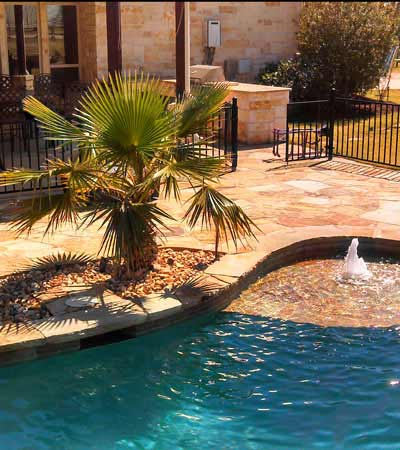FREQUENTLY ASKED QUESTIONS
About Swimming Pool Cleaning and Repair
OUR COMPANY, EMPLOYEES, AND TRUCKS ARE ALL INSURED

POOL MAINTENANCE - PUMPS - ALKALINITY and ph LEVELS
Clear Water Pool Company will be happy to answer any questions about pool repair or cleaning. The following are a few commonly asked questions, but we will be happy to visit with you on the phone in greater detail.
Q: The maintenance personnel said my ph is too low. What does that mean?
A: To kill bacteria and algae, the chlorine in your swimming pool water must have a chemical reaction with it. If the ph is too low, then add sodium bicarbonate, also known as baking soda, or soda ash, to raise the ph to proper levels. Your chlorine will work at optimum efficiency when the ph is between 7.4 - 7.6. A small inexpensive kit carries all of the equipment you need, and we have them in stock. If you would like us to check your ph level and relieve you of swimming pool maintenance chores, we can certainly do that for you.

Pools can have straight sides or
curved sides.
Your imagination is the limit.
A: Because of the heat in the Bryan and College Station, TX area, the chlorine tends to evaporate and we recommend running the pump 15-24 hours a day in the summer and 6-8 hours per day in the winter. It is important to run the pump in the winter months to keep your pool clear of algae and bacteria year round. This will allow maintenance work to be kept at a minimum when summer time arrives in our area.
Q: I want to ensure that my pool is clean before my children, friends, or family members take a swim. How do I determine if it is clean to avoid health risks?
A: It is not always easy to spot problems in a pool so we recommend that the chlorine level, alkalinity, and ph levels be tested on a regular basis. All three must be working together and this will ensure that the invisible bacteria that might be lurking in a pool will be killed and your water will be safe for swimming.
Q: How much water is in a pool? I need to know this for maintenance purposes.
A: There is a simple formula to help you determine how much water is in your pool.
For rectangular, square, or free-form pools:
Multiply the length, times the width, times the average
depth, times 7.5. This will be the number of gallons in
your pool.
For round or oval pools:
Multiply the length, times the width, times the average
depth, times 5.9. This will be the number of gallons in
your pool.
To determine the average depth:
Add the depth of the deep end and the depth of the shallow
end and divide by 2. This will be your average
depth.
A: Yes, Clear Water Pool Company can handle this job. We go through a series of steps that include checking the pump to make sure it is in good working order, checking the ph and alkalinity levels of the water, chlorinating and backwashing it, and then vacuuming the pool of debris.
Q:My pool seems to be losing water but I'm not sure. Is there a way to determine if I have a problem?
A:Here are steps you can take to determine if you have a problem.
Step 1: Place a bucket on a step in your pool.
Step 2: Fill the bucket with water about an inch from the top. (You may need to place a brick in the bucket to keep it in place.)
Step 3: Mark the pool's water level on the outside of the bucket.
Step 4: Mark the water level of the bucket on the inside of the bucket.
Step 5: Operate your pool normally for 24 hours and then check the bucket. If the water level on the outside of the bucket has gone down, you probably have a leak in your pool.
Hundreds of gallons of water can leak each day from a very small hole in your pool that is no larger than a pencil's tip. This is not good for your water bill or for the structure of your pool.

Beautiful stonework makes this pool the focal point of the backyard.